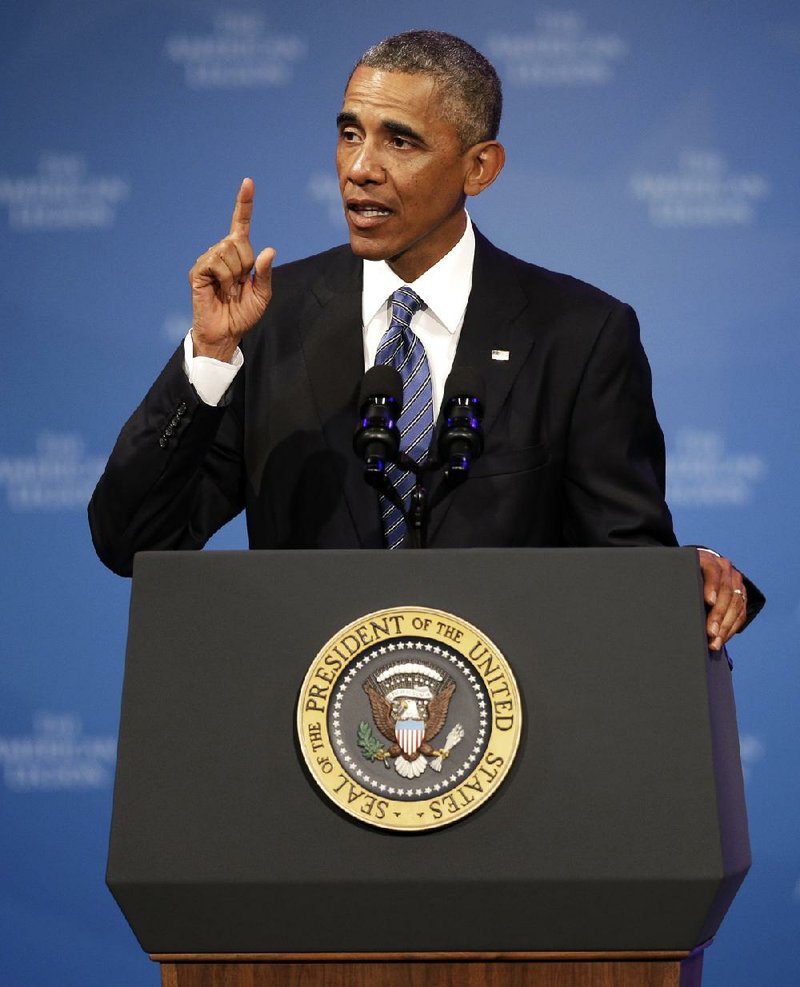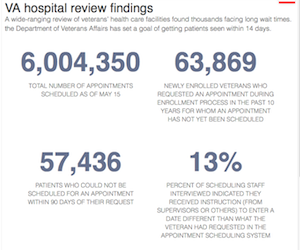CHARLOTTE, N.C. — President Barack Obama on Tuesday promised several thousand military veterans that he would take further action to improve their access to health care and housing as he seeks to turn around a dysfunctional system.
Addressing the national convention of the American Legion, Obama acknowledged that the government needed to “regain credibility” after disclosures of falsified records and poor care, and he vowed to follow through on changes that will make the system “more effective and more efficient” and put veterans first.
“What we’ve come to learn is that the misconduct we’ve seen at too many facilities with long wait times and veterans denied care and folks cooking the books is outrageous and inexcusable,” Obama said. “We are going to get to the bottom of these problems. We are going to fix what is wrong. We are going to do right by you and your families, and that is a solid pledge and commitment I’m making to you here.”
Obama was accompanied by Robert McDonald, a former chief executive of Procter & Gamble who replaced Eric Shinseki as veterans affairs secretary. Shinseki resigned at the end of May after reports of troubles throughout the system.
The president also has signed bipartisan legislation devoting $16 billion to the goal of fixing the veterans’ health care system by, among other things, hiring more providers to shorten waiting times. The new law will give McDonald more authority to fire officials for poor performance and will allow veterans to use other providers if they cannot obtain prompt attention at a Veterans Affairs facility.
The president used the visit to the American Legion convention to announce several additional steps he will take to improve services that are mainly intended to make it easier for veterans to receive mental health care and to lower their monthly housing payments.
Among other things, members of the armed forces leaving the service will be automatically enrolled in the department’s transition program rather than having to seek it out themselves or requiring referrals, officials said.
The Department of Veterans Affairs will test expanded peer support for mental health, conduct studies on early detection of post-traumatic stress and suicidal thoughts, and extend suicide prevention and mental health training for health care providers, chaplains and others who work with veterans.
The administration also will team up with large banks to make it easier for active-duty military service members to reduce mortgage interest rates and will expand efforts to make sure troops can get the student debt relief to which they are already entitled, officials said.
Not everyone was impressed. “President Obama’s actions today fall far short of what’s needed to regain the trust of America’s veterans,” Rep. Jeff Miller, R-Fla., the chairman of the Veterans’ Affairs Committee, said in a statement, adding, “What we need from the president right now is more follow-through and less flash when it comes to helping veterans.”
Obama made his speech on the same day the VA’s Office of Inspector General released a report on the problems that have plagued the agency.
In April, Dr. Samuel Foote, who had worked for the Phoenix VA for more than 20 years before retiring in December, told Congress that up to 40 patients died while awaiting care at the hospital. Foote accused Arizona VA leaders of manipulating data to show shorter patient wait times.
Investigators uncovered large-scale improprieties in the way VA hospitals and clinics across the nation were scheduling veterans for appointments, according to the report, but they found no proof that delays in care caused veterans to die at a Phoenix VA hospital.
The report said workers falsified wait lists while their supervisors looked the other way or even directed it, resulting in chronic delays for veterans seeking care.
Investigators identified 40 patients who died while awaiting appointments in Phoenix, the report said, but added: “While the case reviews in this report document poor quality of care, we are unable to conclusively assert that the absence of timely quality care caused the deaths of these veterans.”
On Tuesday, Foote issued a statement questioning the inspector general’s inability to “conclusively assert” that veterans died because of delays in care.
“Without question, their statement was worded such that the reader will assume that no harm came to the patient due to the delay in care,” he said. “That is unlikely to be true.”
Top Veterans Affairs officials also said the report’s findings were troubling.
“I’m glad that veterans didn’t die because of delays in care, or at least they weren’t able to conclude that they did,” Deputy Veterans Affairs Secretary Sloan Gibson said. “But the fundamental issue is, veterans are waiting too long, and that’s the problem we’ve got to face.”
In a memo responding to the report, McDonald apologized to veterans and pledged to implement the 24 recommendations in the inspector general’s report.
“We sincerely apologize to all veterans and we will continue to listen to veterans, their families, veterans service organizations and our VA employees to improve access to the care and benefits veterans earned an deserve,” said McDonald’s memo, which was also signed by Carolyn Clancy, Veterans Affairs undersecretary for health.
Information for this article was contributed by Peter Baker of The New York Times and by Stephen Ohlemacher of The Associated Press.


